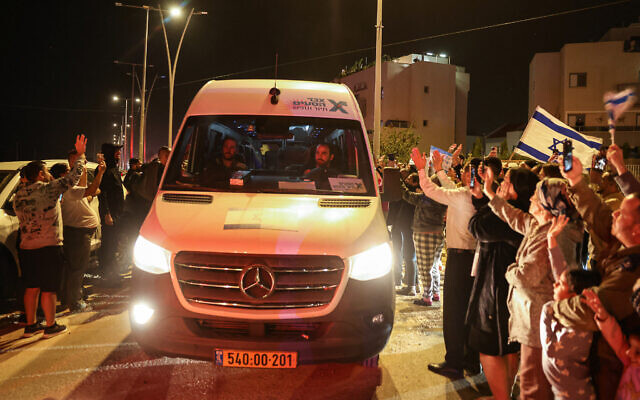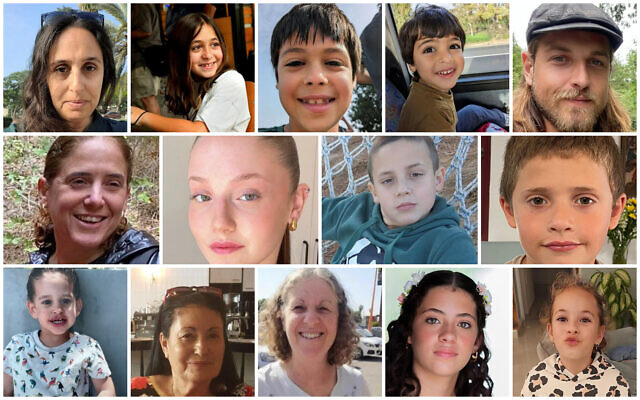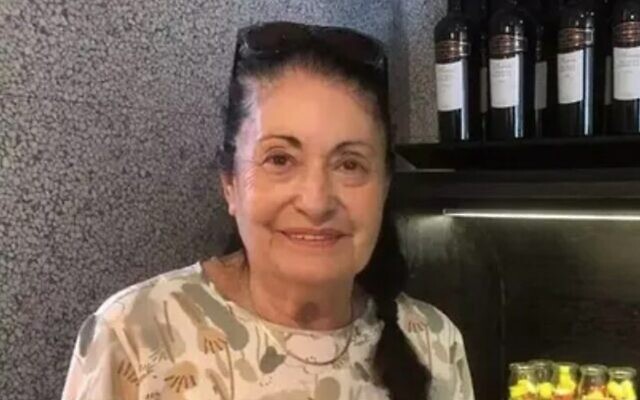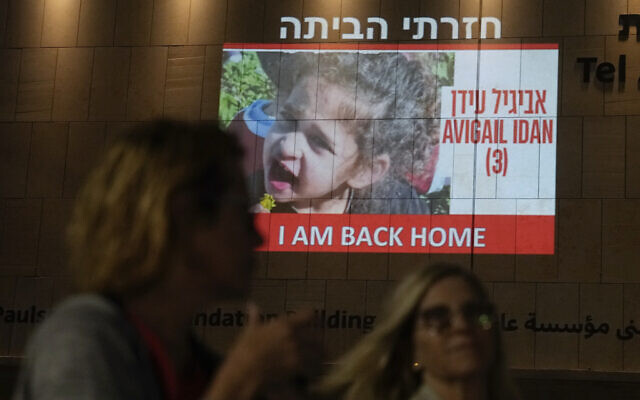



Israel said Monday that it had received the names of the fourth and final group of Israelis to be released under a deal to free women and child hostages from the Hamas terror group, but that it was holding “discussions” and evaluating the names, indicating there could be problems with the scheduled release.
“Discussions are being held on the list that was received overnight and which is now being evaluated in Israel. Additional information will be issued when possible,” said a statement from the Prime Minister’s Office.
It wasn’t immediately clear what the discussions were about and what problems Israel has with the list, which reportedly consists of 11 hostages. Hebrew media said that the families of those on the list have not yet been notified, as they were in previous releases, and would not be until the issues are resolved.
A Qatari source told the Reuters news agency that Hamas also had problems with the names on the list of Palestinians security prisoners set to be released by Israel as part of the deal.
The source said Qatar, which has been mediating the hostage release, has continued working to resolve the problems to ensure that the fourth release would go ahead as scheduled later Monday.
Under the initial terms of the deal, Israel and Hamas agreed that the terror group would release at least 50 Israeli women and children in four installments. In return, Israel would free 150 women and minors in Israeli prisons and there would be a four-day halt to fighting.
There is also a possibility of the truce being extended, with Israel willing to hold off resuming its offensive for an additional 24 hours in exchange for every 10 additional hostages released.
As of Monday, 183 hostages are believed to remain held by Hamas and other terror groups, including 18 children (eight girls and 10 boys) and 43 women.
Monday’s apparent setback was not the first to plague the delicate temporary truce.
On Saturday night, 13 Israeli hostages held by Hamas — eight children, four mothers and a young woman — finally returned to Israel after the terror group delayed their release for hours, claiming Israel was not living up to certain obligations under the deal, an assertion Jerusalem rejected. Hamas relented following reported intense pressure by Qatar, Egypt and the US.
Hamas’s military wing had claimed it was delaying the release until Israel “adheres to the terms of the agreement related to the entry of aid trucks into the northern Gaza Strip and due to failure to adhere to the agreed-upon standards for releasing prisoners.”
However, Israel had allowed 200 trucks into the Strip on Saturday, as required by the deal, and announced that at least 50 of those trucks had reached northern Gaza, a claim confirmed by the Palestinian Red Crescent.
A political source told The Times of Israel that Hamas’s behavior on Saturday evening “embarrassed” Qatari and Egyptian mediators.
Family members have also accused Hamas of violating the terms of the agreement after 13-year-old Hila Rotem Shoshani — one of the hostages released overnight Saturday — was freed without her mother, Raya Rotem.
Hamas claimed they did not know where Raya was. However, Hila told family members she had only been separated from her mother two days before the release. Under the agreement, Hamas had committed to not separating mothers from their children.
The new stalemate comes after a third group of Israeli and foreign hostages was released from Hamas captivity Sunday evening and arrived in Israel, numbering 17 people — 14 Israelis and three Thai citizens.
The Israelis comprised nine children, two mothers, two more women, and one man. Although the Red Cross said an initial medical examination indicated they were all in good condition, one of the elderly Israeli hostages was taken straight via helicopter to Soroka Medical Center in Beersheba, where she remains in critical condition.
Prof. Moti Klein, the head of the trauma unit at Soroka, said Elma Avraham, 84, remains “unstable” and fighting for her life after she was released from Gazan captivity in serious condition.
“One more day and we would not be talking like this,” he told Channel 12 news.
Avraham was sedated and intubated, Klein said. He said she arrived at the hospital Sunday in a state of partial consciousness.
While he could not say for sure, Klein said he suspected that her condition was a result of not receiving necessary medication in Gaza.
The Schneider Children’s Medical Center, where nine children and two mothers were taken, said they all arrived in stable physical condition and were being evaluated both physically and psychologically.
They were reunited with family members at the hospital.
Among those released was Avigail Idan, 4, an American-Israeli citizen from Kibbutz Kfar Aza, whose parents were murdered by Hamas terrorists on October 7 and whom US President Joe Biden had repeatedly pledged to see released.
The group was handed over to the Red Cross around 5 p.m., which delivered them to Israeli forces. Unlike previous releases, which took place at the Rafah crossing in southern Gaza, 13 of the Israelis were transferred through the border fence in the Strip’s north, amid reports, including in Al Jazeera, that they had been held in the Gaza City area, possibly in regions not yet reached by the massive IDF ground offensive.
From the border, they were ferried to Hatzerim Airbase near Beersheba for an initial reception. They were then sent to hospitals to meet their families.
Ten of those freed were from Kfar Aza. Hundreds of evacuated residents of the kibbutz celebrated Sunday evening at an event hall at Shefayim in central Israel, as they watched news of the release. Kibbutz members erupted in cheers at the first glimpses of their neighbors in videos from Gaza.
The man freed, Roni Krivoi, holds dual Russian-Israeli citizenship, and was released at President Vladimir Putin’s request. Krivoi was not freed under the Israel-Hamas framework, which provides for the freeing of at least 50 Israelis over four days, with children, their mothers, and other women prioritized. Krivoi was the only Israeli freed through Rafah, along with the three Thai nationals.
Many of those released have had have a bittersweet return, with family members murdered on October 7 or still held hostage in Gaza.
Some 240 hostages were abducted on October 7, when some 3,000 terrorists burst across the border into Israel from the Gaza Strip by land, air, and sea, killing at least 1,200 people under the cover of a deluge of thousands of rockets fired at Israeli towns and cities.





